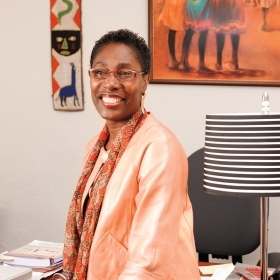Photo by Richard Howard
We caught up with Richard Delacy, visiting lecturer in South Asia studies, for a cup of tea before his Hindi/Urdu class. Originally from Melbourne, Australia, Delacy has spent the last 17 years studying Hindi and teaching South Asian languages in the United States.
Where did your interest in South Asia begin?
I went to Sri Lanka as an exchange student in the ’80s, after my penultimate year of high school. I was in classes with teachers speaking English. And all the boys spoke English, so I didn’t really have to learn Sinhala, though of course they taught me the cuss words. I went back to Australia and people said, well, of course you can speak Sinhala now. And I felt this tremendous sense of guilt.
How did that lead you to Hindi?
I went to university, and I thought, well, I’d like to learn a South Asian language, and Hindi was the language offered. For a long time, I thought that no one single event defines you. But the further I’ve gone through life, I’ve thought it must have been fairly formative to have gone [to Sri Lanka]. Prior to that, it was the last thing on my radar. It was an accident of fate.
What’s your approach to language teaching?
I see my primary task as helping students come to terms with the basics of the language, but also to understand the complexities of the world of South Asia culturally, historically. In this morning’s class, we were doing a language exercise about Delhi and the different sorts of landmarks. And one of them was Jawaharlal Nehru University. I found myself explaining a little bit more about Nehru and the Nehru-Gandhi family and all those sort of things, and then the emergency, and the assassination of Mrs. Gandhi. You can’t, you really can’t, approach this with the idea that you’re just learning functional language. I try to impress upon them that my job is to show what a complex task it is, and that it’s an intellectual task.
How have you found Wellesley students?
I would characterize them as fiercely engaged, and also broad-minded. They do the readings and then they want to ask questions—and they’re serious intellectual questions. That’s part of the culture here.
You’ve published a dozen books about South Asian languages. What’s your latest project?
I just got a contract with Primus in Delhi to do a book on Bollywood.






We ask that those who engage in Wellesley magazine's online community act with honesty, integrity, and respect. (Remember the honor code, alums?) We reserve the right to remove comments by impersonators or comments that are not civil and relevant to the subject at hand. By posting here, you are permitting Wellesley magazine to edit and republish your comment in all media. Please remember that all posts are public.